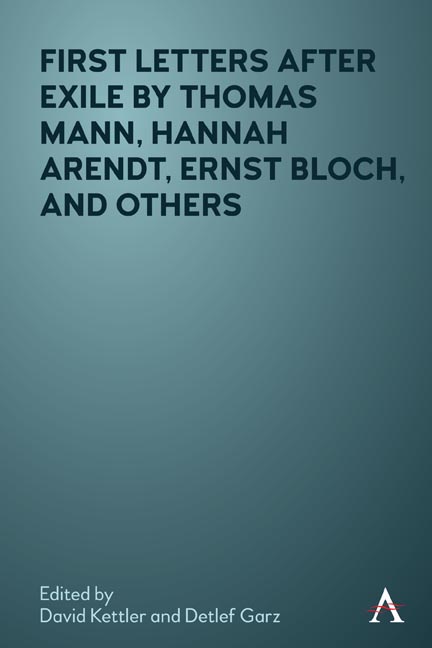Book contents
- Frontmatter
- Contents
- Preface
- Chapter 1 The “First Letters” Exile Project: Introduction
- Chapter 2 “That I Will Return, My Friend, You Do Not Believe Yourself ”: Karl Wolfskehl – Exul Poeta
- Chapter 3 “I Do Not Lift a Stone”: Thomas Mann’s “First Letter” to Walter von Molo
- Chapter 4 Faust Narrative and Impossibility Thesis: Thomas Mann’s Answer to Walter von Molo
- Chapter 5 “That I Am Not Allowed for a Moment to Forget the Ocean of Blood”: Hans-Georg Gadamer and Leo Strauss in Their First Letters after 1946
- Chapter 6 Return into Exile: First Letters to and from Ernst Bloch
- Chapter 7 A Postwar Encounter without Pathos: Otto Kirchheimer’s Critical Response to the New Germany
- Chapter 8 An Exile’s Letter to Old Comrades in Cologne: Wilhelm Sollmann’s Critique of German Social Democracy and Conception of a New Party in Postwar Germany
- Chapter 9 First Letters: Arendt to Heidegger
- Chapter 10 Denazification and Postwar German Philosophy: The Marcuse/Heidegger Correspondence
- Chapter 11 “It Would Be Perhaps a New Exile and Perhaps the Most Painful”: The Theme of Return in Oskar Maria Graf ’s Letters to Hugo Hartung
- Chapter 12 Social Constellation of the Exile at the End of the Second World War and the Pragmatics of the “First Letters”: An Objective Hermeneutic Structural and Sequence Analysis
- Notes on Contributors
- Index
Chapter 9 - First Letters: Arendt to Heidegger
Published online by Cambridge University Press: 25 February 2022
- Frontmatter
- Contents
- Preface
- Chapter 1 The “First Letters” Exile Project: Introduction
- Chapter 2 “That I Will Return, My Friend, You Do Not Believe Yourself ”: Karl Wolfskehl – Exul Poeta
- Chapter 3 “I Do Not Lift a Stone”: Thomas Mann’s “First Letter” to Walter von Molo
- Chapter 4 Faust Narrative and Impossibility Thesis: Thomas Mann’s Answer to Walter von Molo
- Chapter 5 “That I Am Not Allowed for a Moment to Forget the Ocean of Blood”: Hans-Georg Gadamer and Leo Strauss in Their First Letters after 1946
- Chapter 6 Return into Exile: First Letters to and from Ernst Bloch
- Chapter 7 A Postwar Encounter without Pathos: Otto Kirchheimer’s Critical Response to the New Germany
- Chapter 8 An Exile’s Letter to Old Comrades in Cologne: Wilhelm Sollmann’s Critique of German Social Democracy and Conception of a New Party in Postwar Germany
- Chapter 9 First Letters: Arendt to Heidegger
- Chapter 10 Denazification and Postwar German Philosophy: The Marcuse/Heidegger Correspondence
- Chapter 11 “It Would Be Perhaps a New Exile and Perhaps the Most Painful”: The Theme of Return in Oskar Maria Graf ’s Letters to Hugo Hartung
- Chapter 12 Social Constellation of the Exile at the End of the Second World War and the Pragmatics of the “First Letters”: An Objective Hermeneutic Structural and Sequence Analysis
- Notes on Contributors
- Index
Summary
A Letter from Wiesbaden
“I have been writing away at this letter since I left the house and stepped into the car. And I cannot write it yet, late in the night.” Arendt composed the letter that opened with these lines after a brief reunion with Heidegger in Wiesbaden in February 1950. The two must have last seen each other in September 1930, and to have exchanged their last letters at the year change 1932/33. Arendt had gotten to know Heidegger in February 1925; the young student and the married father of a family, her professor of philosophy were secret lovers for five years, before Arendt left Marburg in order to earn her doctorate in Heidelberg from Karl Jaspers and later—after her marriage to Günther Stern in 1929—to leave Germany, initially in the direction of Paris, France. In the same year, Heidegger joined the NSDAP, accepted the office of rector of Freiburg University, and wanted—if also at a self-proclaimed philosophical distance—to become the spiritual leader of National Socialism. In his last letter to Arendt before the war—in the winter of 1933/34—Heidegger openly declared himself to her as anti-Semite: “As for the rest, I am just as much an anti-Semite in university affairs as I was ten years ago and in Marburg.” The meeting in Freiburg that preceded the first postwar letter of 1950 took place as between a man who had disavowed himself politically and inwardly returned to his wife and a former beloved, who had let herself be divorced after a marriage that had been prematurely entered during the emigration and had bound herself lastingly to a different loved man, Heinrich Blücher.
In January 1950, Hannah Arendt let this man, Blücher, know that she still did not know if she wanted to meet Heidegger and that she had found in Heidegger's letters to Jaspers his typical “equal mix of authenticity and deception, or better, cowardice.” Nevertheless: although she reported to her husband on February 7 “not to have the slightest desire” to see Heidegger—whom she refers to here as “this gentleman,” again, she nevertheless wrote a short letter to precisely “this gentleman” on the day of her arrival in Freiburg. She had inquired after Heidegger's address from her former fellow student Hugo Friedrich.
- Type
- Chapter
- Information
- Publisher: Anthem PressPrint publication year: 2021



